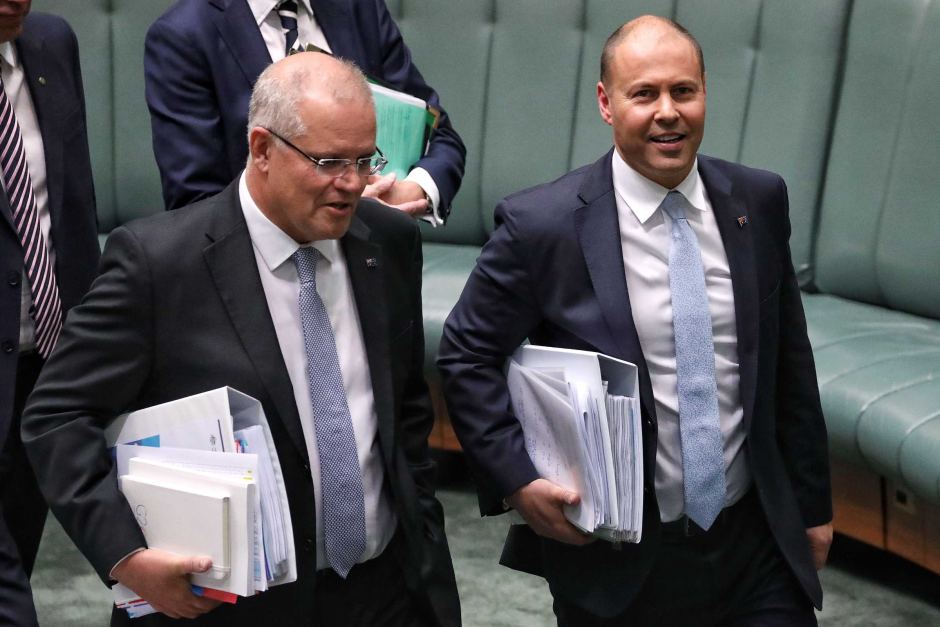When gross debt was 16.8% of GDP in 2013 under Labor, the Coalition condemned it as “spiralling out of control” and a “debt disaster”. Now, debt at 40.2% and rising to 50% of GDP under the Coalition is “strong and sustainable”. Was the Coalition lying then or it is lying now? Alan Austin reports the flip-side of the two-week festival of spin which is the Federal Budget.
Australia has just experienced the annual charade of the federal Government setting out its economic program and the mainstream media feigning to take it seriously. It is a spectacle and a fraud on the population.
The past seven Coalition budgets have promised jobs and growth, a return to budget surplus, expanded infrastructure, a workable climate policy, improved broadband, security for the elderly, support for education and adequate care for the sick.
These are achievable. They were delivered by past governments. They are in place in all comparable countries.
In Australia, however, almost two million workers are unemployed or underemployed, the budget is in deeper deficit than at any time since World War II, infrastructure spending per person is 14 per cent below levels 10 years ago, the nation is a global pariah on climate, broadband speed ranks 56th in the world, the elderly are more vulnerable than ever, school enrolments are at the lowest level in 11 years and health care is a shambles with countless Australian citizens unable to return home.
And while the pandemic played havoc with economies throughout 2020, it did so globally.
The budget process under this Government has been a joke. But this year is worse than ever. Budget documents are riddled with falsehoods.
Here are several from Tuesday’s media release (aka instructions to the press on the key talking points) from Treasurer Frydenberg and Finance Minister Simon Birmingham.
Budget was never balanced
“Australia entered the crisis from a position of economic strength having brought the Budget back to balance for the first time in 11 years.”
Two untruths there.
Despite the Back in Black mugs handed out by the Coalition the budget was not balanced. It came close in June 2019 at negative $690 million. It then blew out to $85.3 billion in 2019-20 and is forecast to reach $161 billion next month.
Australia’s economy over the past year has never been weaker since the Great Depression. Australia’s annual gross domestic product (GDP) has contracted for the past three quarters, most recently coming in at negative 1.12% of GDP in December.
This ranks 75th in the world and 14th in the Organisation for Economic Cooperation and Development (OECD). At the same stage in the recovery from the global financial crisis in 2009, Australia’s annual GDP growth was the OECD’s highest.
The budget deficit has deteriorated from one of the OECD’s four lowest before 2014 to close to the highest today.
“The Australian economy has rebounded at its fastest pace on record over the latter half of last year.”
Yes and no. Yes, there was a rebound, but this was the automatic recovery from the worst economic collapse since the 1930s. The economy shrank by an unprecedented 6.3% of GDP in the 2020 June quarter. The second worst quarterly decline on record was in the following quarter, September 2020.
Despite this recent improvement, the economy is still in negative annual growth.
Economy underperforming not outperforming
“The Australian economy [is] outperforming all major advanced economies in 2020.”
This is not correct, as data from Trading Economics and Statista proves.
Let’s consider six key variables – the jobless rate, annual GDP growth, wages growth, productivity, the budget deficit and gross debt added in the last year. More than 25 developed countries are streets ahead of Australia.
Taiwan, South Korea, Norway, Singapore and Israel are beating Australia on all six outcomes. Ahead on five out of the six are New Zealand, Ireland, Denmark, Estonia, the United Arab Emirates and Ukraine. Leading on four variables and well ahead overall are Germany, Switzerland, the Netherlands, Sweden, Poland, Austria, Estonia, Latvia, Luxembourg, Hong Kong and even Brazil.
Nine of those countries have also kicked Australia’s butt on the latest corruption index score.
“With … nearly one million jobs added since May 2020, there are now more people in work than ever before.”
This is deceptive. Yes there are 947,100 more jobs than in May 2020, but only 69,000 more than in February 2020. Most of those “added” were jobs previously lost being gradually clawed back.
“The Budget demonstrates that our fiscal position remains strong and sustainable with Australia’s debt remaining low by international standards.”
Coalition has it both ways on debt
Two falsehoods here. When gross debt was 16.8% of GDP in 2013, the Coalition condemned this as “spiralling out of control” and a “debt disaster”.
Now, debt at 40.2% rising to 50.0% is “strong and sustainable”. Either they were lying then or they are lying now. Or both.
Under Labor, debt to GDP was fourth-lowest in the OECD. It is now near the middle.
“While the euro area has fallen back into recession, Australia is recovering strongly.”
The euro area has not fallen back into recession. This is a fabrication that Frydenberg repeats at every opportunity.
We have March quarter figures for nine of the 19 euro countries. France and Lithuania are in positive GDP annual growth. Austria has improved from a 5.9% contraction to just 2.7% in March. Italy has advanced from -6.6% to just -1.4%. Belgium has lifted from -4.9% to -1.0%. Germany, Spain and Portugal have improved on the December outcomes by lesser amounts. Only Latvia has declined marginally.
According to trading economics, annual GDP growth for the euro area overall advanced in the March quarter from -4.9% to -1.8%.
No one should believe anything this Government says on the economy.
Alan Austin is a freelance journalist with interests in news media, religious affairs and economic and social issues.

